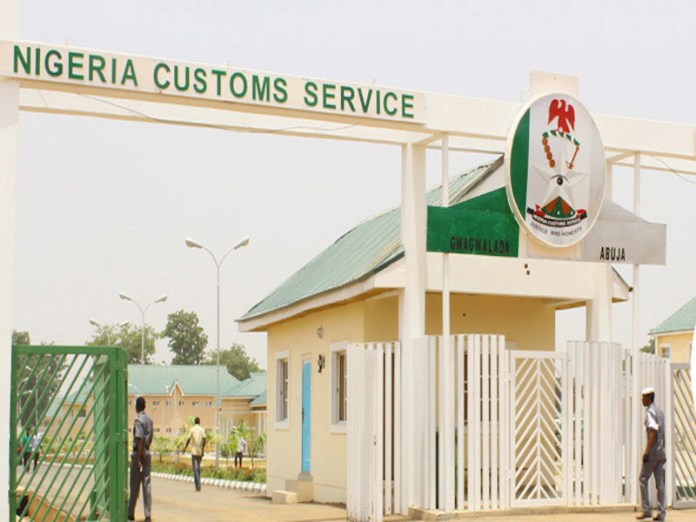- Customs Realises Over N157b in 3 Months
The Nigeria Customs Service (NCS) raked in over N157 billion in three months at Lagos ports, it was learnt.
The amount, findings revealed, was generated by the Apapa and Tin-Can Island Customs commands between January and last month.
At Apapa Port, the Service collected over N81 billion; the Tin-Can Island Command generated over N76 billion.
This is an increase of about N4 billion by the Apapa Command compared to the same period last year, and N14 billion by the Tin-Can Command.
NCS Public Relations Officer (PRO), Apapa Command, Mrs. Nkeiru Nwala, said with the introduction of the Nigeria Integrated Customs Information System II (NICIS II) in Apapa, expected to block revenue leakages as well as the repair of Apapa access roads, the Command would boost its revenue profile.
She said on the command’s anti-smuggling fight in the first quarter, four 4×40 ft containers of controlled drugs, including tramadol in excess of approved milligrammes with Duty Paid Value (DPV) of N110,016,524.00, were seized.
She also said the Command in the first quarter of the year recorded about 280,000 metric tons of exports with a FOB value of $115,093,562.
Mrs Nwala said the Customs Area Controller in charge of Apapa Command, Comptroller Jibril Musa, has continued to renew strategies and mechanisms for the effective implementation of the ease of doing business.
“The Customs Area Controller, Jibril Musa has continued to reinvigorate all strategies and mechanisms put in place for the effective and efficient implementation of the Federal Government’s Executive order on the Ease of Doing Business. It is worthy of note that the NCS is the lead agency in the implementation of the presidential mandate and Apapa Area Command selected as the pilot command had since created the Central Examination Centre (CEC) where all stakeholders involved in cargo clearance conduct examination at an agreed time with reports imputed almost immediately. This synergy/interfacing had paid off remarkably as consignments with no record of infractions are released within 24 hours while those with infractions are referred to dispute resolutions committee for further interventions/investigations.’’
She said Musa pledged to strengthen the relationship with relevant agencies in Apapa.
“The CAC has pledged his resolve to keep strengthening the already robust working relationship/collaboration among all agencies of government for enhanced international trade facilitation. Within the period under review, he played host to different high-level government delegations from within and outside the country with a view of promoting efficiency and facilitation of trade in the country,” she said
Tin-Can Island Command Public Relations Officer Uche Ejesieme said the Command had put in place measures that would enable the it to carry out its statutory mandate.
Apart from Stakeholder Engagement, he said the service had embarked on training and re-training of its officers in line with the Federal Government’s trade facilitations policy.
The image maker said efforts were being made to ensure the policies and programmes of the Command were tailored towards achieving efficiency and competitiveness in the trade value chain.
“The command is at the vanguard of implementation of the Presidential Directive on Ease of Doing Business as the lead agency and have strengthened the relationship with other security/regulatory agencies for actualisation of the Presidential Directive on creating Enabling Business Environment at the Ports.
“In the narrative of Revenue Collection for 2017 and 2018, the Command in the First Quarter of 2017 (January – March) generated a total of N61,839,825,487.91, whereas in the corresponding period of 2017, the command generated N76,789,721,107.34.
“Signifying a positive difference of N14,949,895,619.43. Though the first quarter of each year is usually synonymous with low volume of trade, the migration to NICIS II platform by the Command, also contributed to some hiccups that affected declarations, but which we have surmounted,” he said.

 Naira4 weeks ago
Naira4 weeks ago
 Naira4 weeks ago
Naira4 weeks ago
 Travel3 weeks ago
Travel3 weeks ago
 Naira3 weeks ago
Naira3 weeks ago
 Jobs4 weeks ago
Jobs4 weeks ago
 Naira3 weeks ago
Naira3 weeks ago
 Investment4 weeks ago
Investment4 weeks ago
 Travel4 weeks ago
Travel4 weeks ago




























